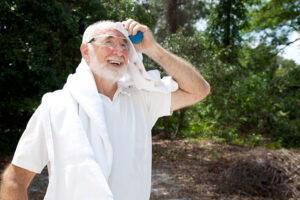Heat Exhaustion vs. Heatstroke – How Can Senior Care Help Prevent Them?

Senior Care in South Brunswick NJ
Across the country, states have been dealing with scorching temperatures. It’s been the hottest weather in recorded history in Northwest cities like Seattle and Portland. It’s been over 100 in those cities and many others. Some of the ages most affected by this hot weather are older adults.
Why does that happen? When you’re older, you don’t sweat as much. The purpose of sweat is to help cool the skin when the body is too hot.
You also lose some of the urge to drink, increasing the risk of dehydration. You also have chronic health conditions like heart disease and kidney disease affecting your body. All of this heightens the risk for heat exhaustion and heatstroke.
The Differences Between Heat Exhaustion and Heat Stroke
Heat exhaustion occurs before heat stroke. It’s a precursor to heat stroke that signals that your body is severely overheating.
Symptoms of heat exhaustion include excessive sweating without exertion, lightheadedness, muscle weakness, nausea, and vomiting. If steps are not taken to address the heat exhaustion, it will progress to heatstroke.
Heatstroke sets in when the core body temperature reaches 103 degrees Fahrenheit. Someone with heatstroke may pass out, become agitated, and have very red dry skin. A severe headache, cold chills, and rapid heart rate are also common.
If you suspect your mom or dad has heatstroke, seek medical attention. Call paramedics or rush them to the ER or doctor’s office.
Preventing Both Heat Exhaustion and Heat Stroke
Preventative measures are the best way to prevent heat exhaustion and heatstroke. When it’s hot, your parents need to wear loose, lightweight clothing. Cotton is best, as are light colors. Black and dark colors attract the sun.
Make sure your parents are well hydrated. They need to drink a small glass of water each hour. If they’re sweating more because of the heat, they need to increase their fluid intake. If they don’t like to drink water, add frozen berries or citrus fruit slices to make it taste more appealing.
Observe them. If your mom and dad show signs of heat exhaustion, wearing a damp t-shirt helps lower the body temperature. When it dries out, dampen it again. Air conditioning keeps them cool, but a fan and a damp t-shirt are a good option if they don’t have AC.
If your parents live alone and you’re not nearby, ask neighbors, family friends, and family members to stop in and check on them. If that’s not an option, hire senior care aides for companionship services. With senior care, your parents have someone stopping in to see how they’re doing.
If you or an aging loved one is considering senior care in South Brunswick, NJ, please contact the caring staff at Care Street Home Care today. Call (732) 607-8870.
- Signs Your Senior Parent Needs Home Care Assistance - January 17, 2025
- Hearing Rehabilitation: Empowering Seniors for Better Living - January 10, 2025
- Understanding How Cartilage Changes Over the Years - January 3, 2025
